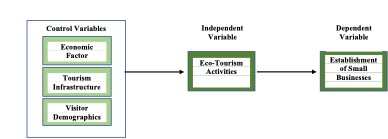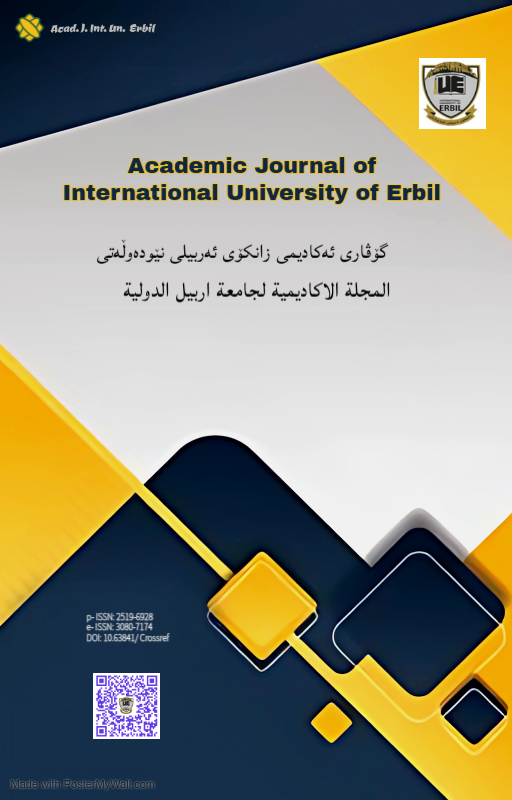Exploring the Influence of Ecotourism and Sustainable Tourism on Small Business Creation and Developing the Local Communities' Economy: A Study of Activities, Infrastructure, and Demographic Factors in Sulaymaniyah Governorate – Kurdistan region of Iraq
Influence of Ecotourism and Sustainable Tourism on Small Business Creation and Developing the Local Communities' Economy
DOI:
https://doi.org/10.63841/iue24501Keywords:
Eco-tourism Activities, Sustainable Tourism, Tourism Infrastructure, Small Businesses, Local Community EconomyAbstract
In Sulaymaniyah City, Kurdistan Region of Iraq, this quantitative study was conducted in 2024 to examine the relationship between the establishment of small businesses and ecotourism. The total of the 92 respondents, who ranged in income and work experience, were between the ages of 18 and 45, with a few respondents being above 45. The majority of participants who travel for ecotourism, whether frequently or infrequently, primarily visit natural and cultural sites, according to the descriptive statistics. To confirm that the questionnaire items consistently reflected the same concept, a reliability test was conducted. The correlation analysis revealed a moderate to strong positive relationship between ecotourism activities and the development of small businesses. Economic factors and tourism infrastructure have a significant impact on this relationship, as indicated by regression and ANOVA results, which support the idea that these factors encourage small business growth. Additionally, the kinds of small businesses that are established are somewhat influenced by the demographics of visitors. The results show that there is a significant relationship between tourism infrastructure and the enhancement of the economic situation, which encourages local entrepreneurs and the sustainability of those businesses, leading to the optimization of socioeconomic advantages of ecotourism.
Downloads
References
T. C. H. Tao and G. Wall, “Tourism as a sustainable livelihood strategy,” Tourism Manage., vol. 30, no. 1, pp. 90–98, 2009.
L. Dwyer, “Economic benefits of tourism: Theoretical perspectives and policy implications,” J. Travel Res., vol. 57, no. 5, pp. 563–576, 2018.
S. H. Mejeed, A. R. Aljanabi, and J. M. Kasem, “The mediating role of marketing agility on the relationship between entrepreneurial resilience, absorptive capacity, and new product performance,” Int. J. Innov. Manage., vol. 29, no. 03n04, pp. 2550015, Feb. 2025, doi: 10.1142/S136391962550015X.
S. Blangy and H. Mehta, “Ecotourism and development: A new alliance for conservation,” J. Ecotourism, vol. 5, no. 1–2, pp. 1–6, 2006.
M. Honey, “Ecotourism and Sustainable Development: Who Owns Paradise?,” 2nd ed. Washington, DC: Island Press, 2008.
A. B. Ahmad and S. Hashemi, “Economic impacts of tourism in the Kurdistan Region of Iraq: A case study of Sulaymaniyah,” J. Tourism Dev., vol. 35, no. 2, pp. 15–32, 2021.
E. Inskeep, Tourism Planning: An Integrated and Sustainable Development Approach. New York, NY: Van Nostrand Reinhold, 1991.
R. Sharpley, “Host perceptions of tourism: A review of the research,” Tourism Manage., vol. 42, pp. 37–49, 2014.
S. N. Fadhil, N. F. Ahmed, and N. H. Mahmood, “The significance of management information system in improving organizational performance and effectiveness,” J. Univ. Garmian, vol. 9, no. 4, pp. 195–211, Dec. 2020, doi: 10.24271/garmian.. 207017.
J. Smith, “Ecotourism and small businesses: Exploring economic dimensions,” J. Sustain. Tourism, vol. 8, no. 2, pp. 45–58, 2022.
R. W. Butler, Tourism Development and the Environment: Beyond Sustainability?, Tourism Recreation Research, vol. 28, no. 3, pp. 45–54, 2003.
D. E. Hawkins and A. M. Mann, “The World Bank’s role in tourism development,” Annals of Tourism Research, vol. 34, no. 2, pp. 348–363, 2007.
J. Barney, “Firm Resources and Sustained Competitive Advantage,” Journal of Management, vol. 17, no. 1, pp. 99–120, 1991.
S. Brida, D. Pulina, A. R. Pereyra, and W. Riaño, “Tourism and Economic Growth: A Panel Data Approach,” Current Issues in Tourism, vol. 14, no. 4, pp. 323–338, 2011.
R. W. Butler, “The Concept of a Tourist Area Cycle of Evolution: Implications for Management of Resources,” Canadian Geographer, vol. 24, no. 1, pp. 5–12, 1980.
C. Ritchie and G. Crouch, The Competitive Destination: A Sustainable Tourism Perspective, CABI Publishing, 2003.
I. Ajzen, “The Theory of Planned Behavior,” Organizational Behavior and Human Decision Processes, vol. 50, no. 2, pp. 179–211, 1991.
P. Kotler, J. T. Bowen, and J. C. Makens, Marketing for Hospitality and Tourism, 7th ed., Pearson Education, 2017.
S. Shane and S. Venkataraman, “The Promise of Entrepreneurship as a Field of Research,” Academy of Management Review, vol. 25, no. 1, pp. 217–226, 2000.
R. E. Freeman, Strategic Management: A Stakeholder Approach, Boston: Pitman, 1984.
D. B. Weaver, “The Encyclopedia of Ecotourism,” Wallingford, UK: CABI, 2010.
M. C. Simpson and S. Gössling, “Economic Sustainability in Coastal Tourism: A Multi-Stakeholder Approach,” London, UK: Routledge, 2016.
D. A. Fennell, “Ecotourism,” London, UK: Routledge, 2014.
D. Newsome, S. A. Moore, and R. K. Dowling, “Natural Area Tourism: Ecology, Impacts, and Management,” Bristol, UK: Channel View Publications, 2012.
R. Duffy, “Ecotourism and the Empowerment of Local Communities,” Oxford, UK: Oxford Univ. Press, 2009.
J. Higham, “Sustainable Tourism: A Global Perspective,” 2nd ed. London, UK: Routledge, 2018.
R. Buckley, “Ecotourism: Principles and Practices,” Wallingford, UK: CABI, 2009.
D. Weaver, “Ecotourism,” Oxford, UK: Wiley-Blackwell, 2011.
M. P. Navarro et al., “Ecotourism as a tool for local development: A review of the evidence,” J. Sustain. Dev., vol. 10, no. 4, pp. 111–121, 2017.
I. Patterson and D. Pan, “Tourism infrastructure: The forgotten component of sustainable tourism,” Tourism Manage., vol. 54, pp. 426–436, 2016.
S. N. Fadhil, R. M. Majid, and S. H. Hama Salih, “The impact of e-marketing channels on online consumer buying behavior: A study on brand branches and official agencies of food item companies in KRI - Sulaymaniyah city,” Humanit. J. Univ. Zakho (HJUOZ), vol. 10, no. 2, pp. 582–593, Jun. 2022, doi: 10.26436/hjuoz.2022.10.2.782.
J. R. B. Ritchie and G. I. Crouch, “The Competitive Destination: A Sustainable Tourism Perspective,” Wallingford, UK: CABI, 2003.
M. W. Mohammed, B. Feizizadeh, H. Klug, and others, “Ecotourism sustainability assessment using geospatial multiple approach in the Kurdistan region of Iraq,” GeoJournal, vol. 88, pp. 3283–3306, 2023, doi: 10.1007/s10708-022-10807-0.
R. Matthews et al., “Heritage and ecotourism for sustainable development in Iraqi Kurdistan,” Central Zagros Archaeological Project, University of Reading & Directorate of Antiquities and Heritage, Slemani, Project Report, 2022. [Online]. Available: https://www.czap.org/HESDIK
UNDP Iraq, “UNDP Iraq and USAID seek to revitalize tourism in the Kurdistan Region,” UNDP, 2023.
R. Harun, G. O. Chiciudean, K. Sirwan, F. H. Arion, and I. C. Muresan, “Attitudes and perceptions of the local community towards sustainable tourism development in Kurdistan Regional Government, Iraq,” Sustainability, vol. 10, no. 9, art. no. 2991, Aug. 2018, doi: 10.3390/su10092991.
D. Mohammed, “Eco-tourism in Kurdistan: Natural wonders captivate global travelers,” Kurdistan24, April. 20, 2025. [Online]. Available: https://www.kurdistan24.net/en/story/836059/eco-tourism-in-kurdistan-natural-wonders-captivate-global-travelers
J. Cohen, Statistical Power Analysis for the Behavioral Sciences, 2nd ed., Hillsdale, NJ: Lawrence Erlbaum Associates, 1988. DOI: 10.4324/9780203771587.
A. Field, Discovering Statistics Using IBM SPSS Statistics, 4th ed., Thousand Oaks, CA: Sage Publications, 2013. ISBN 978-1446249178.
A. J. Veal, Research Methods for Leisure and Tourism, 5th ed., Harlow, UK: Pearson Education Limited, 2017. ISBN: 978 1292115290.
S. Sarky, “Participatory planning for sustainable tourism development: a case study of ecotourism in the Kurdistan Region of Iraq,” Ph.D. dissertation, Univ. of Southampton, Southampton, U.K., 2016. [Online]. Available: https://eprints.soton.ac.uk/397582/
A. F. Ahmad and W. M. K. Balisany, “Sustainable tourism management and ecotourism as a tool to evaluate tourism's contribution to the sustainable development goals and local community,” Journal of Tourism and Sustainability, vol. 2, no. 5, May 2023. [Online]. Available: https://www.researchgate.net/publication/370984082_Sustainable_Tourism_Management_and_Ecotourism_as_a_Tool_to_Evaluate_Tourism's_Contribution_to_the_Sustainable_Development_Goals_and_Local_Community
M. W. Mohammad, “GIS-Based Ecotourism Potentially Assessment in Kurdistan Region – Iraq,” Ph.D. dissertation, Department of Remote Sensing and Geographic Information System, Faculty of Planning and Environmental Sciences, University of Tabriz, Tabriz, Iran, 2024.
T. T. Le, “Influences of the ecotourism industry in Mekong Delta – Vietnam: The mediating role of tourist satisfaction,” Cogent Business & Management, vol. 11, no. 1, Art. no. 2353570, 2024. [Online]. Available: https://doi.org/10.1080/23311975.2024.2353570
H. Zhang, Q. Liang, Y. Li, and P. Gao, “Promoting eco‑tourism for the green economic recovery in ASEAN,” Economic Change and Restructuring, vol. 56, no. 3, pp. 2021–2036, 2023. doi: 10.1007/s10644‑023‑09492‑x

Downloads
Published
Issue
Section
License
Copyright (c) 2025 Academic Journal of International University of Erbil

This work is licensed under a Creative Commons Attribution-NonCommercial-NoDerivatives 4.0 International License.











